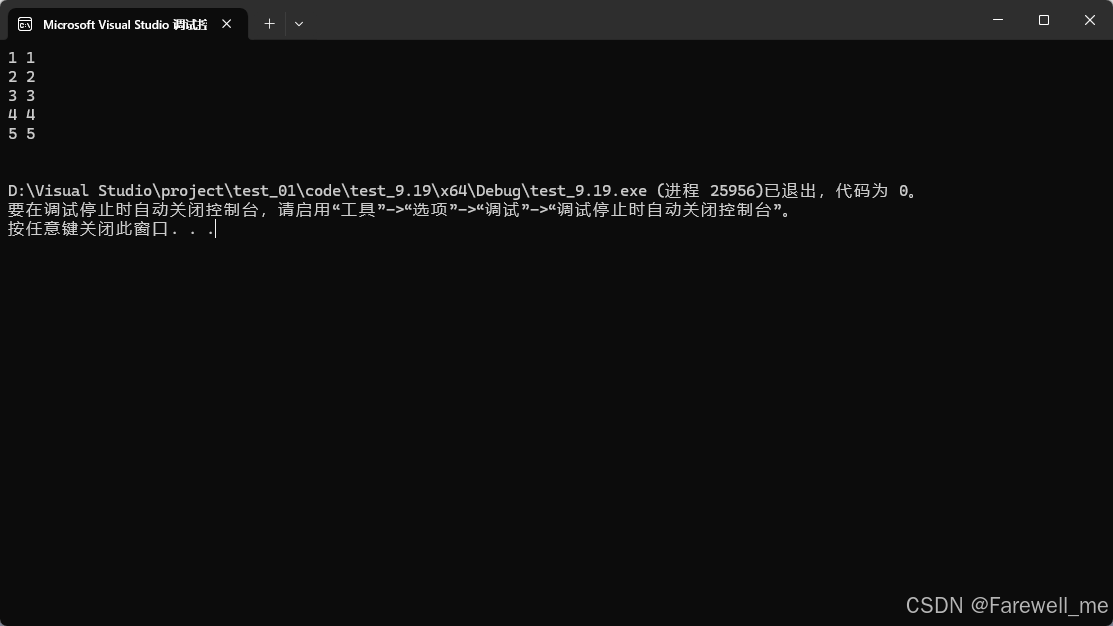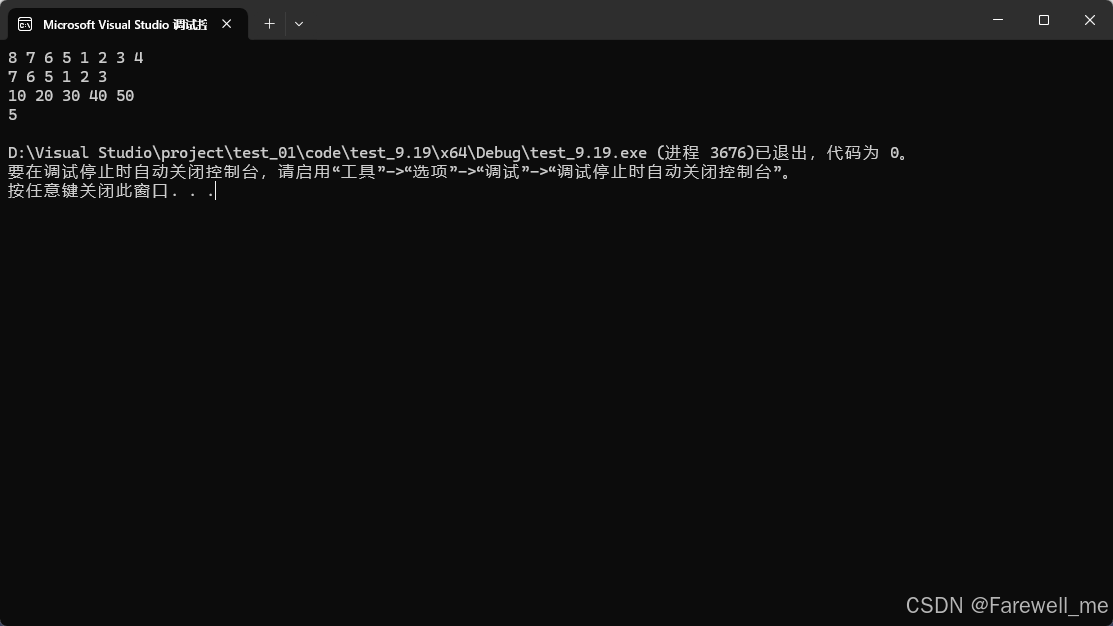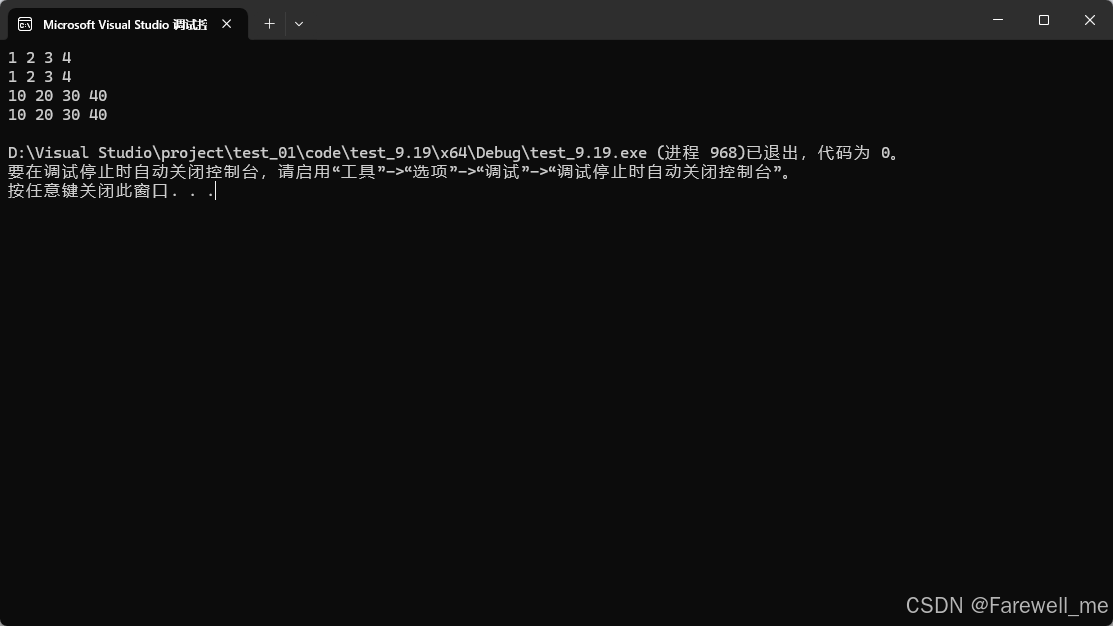文章目录
前言
C++模拟实现list:list、list类的初始化和尾插、list的迭代器的基本实现、list的完整实现、测试、整个list类等的介绍
一、list
list本质上是一个双向带头循环链表。
实现list类,需要节点类(clase list_node)、迭代器(class __list_iterator);
节点类(clase list_node): 定义每个节点的结构;
迭代器(class __list_iterator): 使用节点的指针封装出一个类,可以使用运算符重载的形式更好的访问链表;
二、list类的初始化和尾插
cpp
namespace hhb
{
// 节点
template <class T>
struct list_node
{
list_node(const T& val = T())
: _next(nullptr)
, _prev(nullptr)
, _val(val)
{}
list_node<T>* _next;
list_node<T>* _prev;
T _val;
};
// 链表
template<class T>
class list
{
typedef list_node<T> Node;
public:
list()
{
_head = new Node;
_head->_next = _head;
_head->_prev = _head;
}
void push_back(const T& x)
{
Node* newNode = new Node(x);
Node* tail = _head->_prev;
newNode->_next = _head;
newNode->_prev = tail;
tail->_next = newNode;
_head->_prev = newNode;
}
private:
Node* _head;
};
}
三、list的迭代器的基本实现
- 使用链表节点的指针封装出一个类,是list链表的访问可以向vector一样使用++等操作访问
- vector和list的使用,虽然在形式上一样,但是他们的底层是不一样的
- (*)vector迭代器是对指针的解引用
- (*)list迭代器是调用operator(解引用操作符)函数重载,本质是不一样的
对于const迭代器,是operator(*)和 operator(->)的运算符重载函数的返回值不一样,因此需要增加两个模板参数
- 即: (T& 和 T*)
cpp
// 迭代器
template <class T, class Ref, class Ptr>
struct __list_iterator
{
typedef list_node<T> Node;
typedef __list_iterator<T, Ref, Ptr> self;
public:
__list_iterator(Node* node)
:_node(node)
{}
Ref operator*()
{
return _node->_val;
}
Ptr operator->()
{
return &_node->_val;
}
self& operator++()
{
_node = _node->_next;
return *this;
}
self operator++(int)
{
self tmp(*this);
_node = _node->_next;
return tmp;
}
self& operator--()
{
_node = _node->_prev;
return *this;
}
self operator--(int)
{
self tmp(*this);
_node = _node->_prev;
return tmp;
}
bool operator!=(const self& it) const
{
return _node != it._node;
}
bool operator==(const self& it) const
{
return _node == it._node;
}
Node* _node;
};- operator->运算符重载编译器会进行优化, 如下:
cpp
struct A
{
public:
A(int a1 = 0, int a2 = 0)
: _a1(a1)
, _a2(a2)
{}
int _a1;
int _a2;
};
void test_list02()
{
hhb::list<A> lt;
lt.push_back(A(1, 1));
lt.push_back(A(2, 2));
lt.push_back(A(3, 3));
lt.push_back(A(4, 4));
lt.push_back(A(5, 5));
hhb::list<A>::iterator it = lt.begin();
while (it != lt.end())
{
//cout << (*it)._a1 << " " << (*it)._a2 << " " << endl;
cout << it->_a1 << " " << it->_a2 << " " << endl;
// 此处编译器进行了优化, it->返回的是T* 也就是 A*, 如果要访问A的成员
// 按道理来讲,应该是 (it->)->_a1 / (it->)->_a2 来进行访问
++it;
}
cout << endl;
}
四、list的完整实现
- list需要有size()的接口,所以需要对链表节点个数进行计数,增加一个成员变量_size.
- 实现insert()和erase()接口后,push_back()和push_front()、pop_back()和pop_front()接口都可以复用接口。
- clear()只清除(不包含哨兵位的头节点)数据,不销毁链表
- 析构函数调用clear()后,释放_head节点(哨兵位的头节点)
- 拷贝构造函数在拷贝之前,一定要先自己初始化(创建哨兵位的头节点)
- 赋值(=)运算符重载使用现代写法,拷贝构造加交换函数加自动调用析构函数。
cpp
// 链表
template<class T>
class list
{
typedef list_node<T> Node;
public:
typedef __list_iterator<T, T&, T*> iterator;
typedef __list_iterator<T, const T&, const T*> const_iterator;
iterator begin()
{
return _head->_next;
}
iterator end()
{
return _head;
}
const_iterator begin() const
{
return _head->_next;
}
const_iterator end() const
{
return _head;
}
void emptyInit()
{
_head = new Node;
_head->_next = _head;
_head->_prev = _head;
_size = 0;
}
list()
{
emptyInit();
}
list(const list<T>& lt)
{
emptyInit();
for (auto e : lt)
{
push_back(e);
}
}
void swap(list<T>& lt)
{
std::swap(_head, lt._head);
std::swap(_size, lt._size);
}
list<T> operator=(list<T> lt)
{
swap(lt);
return *this;
}
~list()
{
clear();
delete _head;
_head = nullptr;
_size = 0;
}
void push_back(const T& x)
{
//Node* newNode = new Node(x);
//Node* tail = _head->_prev;
//newNode->_next = _head;
//newNode->_prev = tail;
//tail->_next = newNode;
//_head->_prev = newNode;
insert(end(), x);
}
void push_front(const T& x)
{
insert(begin(), x);
}
void pop_back()
{
erase(--end());
}
void pos_front()
{
erase(begin());
}
iterator insert(iterator pos, const T& x)
{
Node* newNode = new Node(x);
Node* cur = pos._node;
Node* prev = cur->_prev;
newNode->_next = cur;
newNode->_prev = prev;
cur->_prev = newNode;
prev->_next = newNode;
++_size;
return newNode;
}
iterator erase(iterator pos)
{
assert(pos != end());
Node* cur = pos._node;
Node* prev = cur->_prev;
Node* next = cur->_next;
prev->_next = next;
next->_prev = prev;
delete cur;
cur = nullptr;
--_size;
return next;
}
//size_t size()
//{
// int sz = 0;
// iterator it = begin();
// while (it != end())
// {
// sz++;
// ++it;
// }
//
// return sz;
//}
size_t size()
{
return _size;
}
void clear()
{
iterator it = begin();
while (it != end())
{
it = erase(it);
}
_size = 0;
}
private:
Node* _head;
size_t _size;
};
}五、测试
- 测试push_back, pop_back可以顺便测试insert, erase函数, 所以不单独测试insert和erase函数
cpp
void test_list03()
{
hhb::list<int> lt;
lt.push_back(1);
lt.push_back(2);
lt.push_back(3);
lt.push_back(4);
lt.push_front(5);
lt.push_front(6);
lt.push_front(7);
lt.push_front(8);
for (auto e : lt)
{
cout << e << " ";
}
cout << endl;
lt.pop_back();
lt.pos_front();
for (auto e : lt)
{
cout << e << " ";
}
cout << endl;
lt.clear();
lt.push_back(10);
lt.push_back(20);
lt.push_back(30);
lt.push_back(40);
lt.push_back(50);
for (auto e : lt)
{
cout << e << " ";
}
cout << endl;
cout << lt.size() << endl;
}
- 测试拷贝构造和赋值运算符重载
cpp
void test_list04()
{
hhb::list<int> lt;
lt.push_back(1);
lt.push_back(2);
lt.push_back(3);
lt.push_back(4);
for (auto e : lt)
{
cout << e << " ";
}
cout << endl;
hhb::list<int> lt1(lt);
for (auto e : lt1)
{
cout << e << " ";
}
cout << endl;
hhb::list<int> lt2;
lt2.push_back(10);
lt2.push_back(20);
lt2.push_back(30);
lt2.push_back(40);
lt1 = lt2;
for (auto e : lt1)
{
cout << e << " ";
}
cout << endl;
for (auto e : lt2)
{
cout << e << " ";
}
cout << endl;
}
六、整个list类
cpp
// list.h
#pragma once
#include <assert.h>
namespace hhb
{
// 节点
template <class T>
struct list_node
{
list_node(const T& val = T())
: _next(nullptr)
, _prev(nullptr)
, _val(val)
{}
list_node<T>* _next;
list_node<T>* _prev;
T _val;
};
// 迭代器
template <class T, class Ref, class Ptr>
struct __list_iterator
{
typedef list_node<T> Node;
typedef __list_iterator<T, Ref, Ptr> self;
public:
__list_iterator(Node* node)
:_node(node)
{}
Ref operator*()
{
return _node->_val;
}
Ptr operator->()
{
return &_node->_val;
}
self& operator++()
{
_node = _node->_next;
return *this;
}
self operator++(int)
{
self tmp(*this);
_node = _node->_next;
return tmp;
}
self& operator--()
{
_node = _node->_prev;
return *this;
}
self operator--(int)
{
self tmp(*this);
_node = _node->_prev;
return tmp;
}
bool operator!=(const self& it) const
{
return _node != it._node;
}
bool operator==(const self& it) const
{
return _node == it._node;
}
Node* _node;
};
// 链表
template<class T>
class list
{
typedef list_node<T> Node;
public:
typedef __list_iterator<T, T&, T*> iterator;
typedef __list_iterator<T, const T&, const T*> const_iterator;
iterator begin()
{
return _head->_next;
}
iterator end()
{
return _head;
}
const_iterator begin() const
{
return _head->_next;
}
const_iterator end() const
{
return _head;
}
void emptyInit()
{
_head = new Node;
_head->_next = _head;
_head->_prev = _head;
_size = 0;
}
list()
{
emptyInit();
}
list(const list<T>& lt)
{
emptyInit();
for (auto e : lt)
{
push_back(e);
}
}
void swap(list<T>& lt)
{
std::swap(_head, lt._head);
std::swap(_size, lt._size);
}
list<T> operator=(list<T> lt)
{
swap(lt);
return *this;
}
~list()
{
clear();
delete _head;
_head = nullptr;
_size = 0;
}
void push_back(const T& x)
{
//Node* newNode = new Node(x);
//Node* tail = _head->_prev;
//newNode->_next = _head;
//newNode->_prev = tail;
//tail->_next = newNode;
//_head->_prev = newNode;
insert(end(), x);
}
void push_front(const T& x)
{
insert(begin(), x);
}
void pop_back()
{
erase(--end());
}
void pos_front()
{
erase(begin());
}
iterator insert(iterator pos, const T& x)
{
Node* newNode = new Node(x);
Node* cur = pos._node;
Node* prev = cur->_prev;
newNode->_next = cur;
newNode->_prev = prev;
cur->_prev = newNode;
prev->_next = newNode;
++_size;
return newNode;
}
iterator erase(iterator pos)
{
assert(pos != end());
Node* cur = pos._node;
Node* prev = cur->_prev;
Node* next = cur->_next;
prev->_next = next;
next->_prev = prev;
delete cur;
cur = nullptr;
--_size;
return next;
}
//size_t size()
//{
// int sz = 0;
// iterator it = begin();
// while (it != end())
// {
// sz++;
// ++it;
// }
//
// return sz;
//}
size_t size()
{
return _size;
}
void clear()
{
iterator it = begin();
while (it != end())
{
it = erase(it);
}
_size = 0;
}
private:
Node* _head;
size_t _size;
};
}- 整个测试
cpp
#define _CRT_SECURE_NO_WARNINGS
#include <iostream>
#include <list>
using namespace std;
#include "list.h"
void print1(const hhb::list<int>& lt)
{
hhb::list<int>::const_iterator it = lt.begin();
while (it != lt.end())
{
cout << *it << " ";
++it;
}
cout << endl;
}
void test_list01()
{
hhb::list<int> lt;
lt.push_back(1);
lt.push_back(2);
lt.push_back(3);
lt.push_back(4);
lt.push_back(5);
hhb::list<int>::iterator it = lt.begin();
while (it != lt.end())
{
cout << *it << " ";
++it;
}
cout << endl;
for (auto e : lt)
{
cout << e << " ";
}
cout << endl;
print1(lt);
}
struct A
{
public:
A(int a1 = 0, int a2 = 0)
: _a1(a1)
, _a2(a2)
{}
int _a1;
int _a2;
};
void test_list02()
{
hhb::list<A> lt;
lt.push_back(A(1, 1));
lt.push_back(A(2, 2));
lt.push_back(A(3, 3));
lt.push_back(A(4, 4));
lt.push_back(A(5, 5));
hhb::list<A>::iterator it = lt.begin();
while (it != lt.end())
{
//cout << (*it)._a1 << " " << (*it)._a2 << " " << endl;
cout << it->_a1 << " " << it->_a2 << " " << endl;
// 此处编译器进行了优化, it->返回的是T* 也就是 A*, 如果要访问A的成员
// 按道理来讲,应该是 (it->)->_a1 / (it->)->_a2 来进行访问
++it;
}
cout << endl;
}
void test_list03()
{
hhb::list<int> lt;
lt.push_back(1);
lt.push_back(2);
lt.push_back(3);
lt.push_back(4);
lt.push_front(5);
lt.push_front(6);
lt.push_front(7);
lt.push_front(8);
for (auto e : lt)
{
cout << e << " ";
}
cout << endl;
lt.pop_back();
lt.pos_front();
for (auto e : lt)
{
cout << e << " ";
}
cout << endl;
lt.clear();
lt.push_back(10);
lt.push_back(20);
lt.push_back(30);
lt.push_back(40);
lt.push_back(50);
for (auto e : lt)
{
cout << e << " ";
}
cout << endl;
cout << lt.size() << endl;
}
void test_list04()
{
hhb::list<int> lt;
lt.push_back(1);
lt.push_back(2);
lt.push_back(3);
lt.push_back(4);
for (auto e : lt)
{
cout << e << " ";
}
cout << endl;
hhb::list<int> lt1(lt);
for (auto e : lt1)
{
cout << e << " ";
}
cout << endl;
hhb::list<int> lt2;
lt2.push_back(10);
lt2.push_back(20);
lt2.push_back(30);
lt2.push_back(40);
lt1 = lt2;
for (auto e : lt1)
{
cout << e << " ";
}
cout << endl;
for (auto e : lt2)
{
cout << e << " ";
}
cout << endl;
}
int main()
{
//test_list01();
test_list02();
//test_list03();
//test_list04();
return 0;
}总结
C++模拟实现list:list、list类的初始化和尾插、list的迭代器的基本实现、list的完整实现、测试、整个list类等的介绍